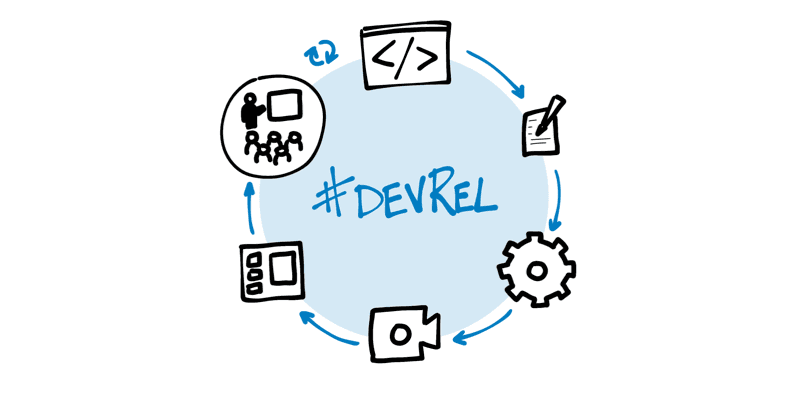Developer relations (DevRel) is a crucial aspect of modern software development. It is a specialized field that is dedicated to building strong and lasting relationships between developers and the companies that provide them with tools, software, and services. One of the key roles in DevRel is that of the developer advocate. A developer advocate is a technical evangelist who works to promote a product, platform, or technology to developers and the wider developer community. In this blog post, we will explore what developer relations is, why it is important, and the work of a developer advocate.
What is Developer Relations?
Developer relations is the practice of building and nurturing a community of developers around a particular technology or platform. It involves creating resources, events, and programs that support developers in using and integrating a company's technology into their projects. The goal of DevRel is to foster a sense of loyalty and engagement among developers, which can lead to increased adoption, brand recognition, and ultimately, revenue.
DevRel encompasses a range of activities, including:
-
Creating and maintaining developer-focused documentation, tutorials, and code samples
-
Hosting events such as hackathons, meetups, and conferences
-
Providing technical support and troubleshooting assistance
-
Engaging with developers on social media and other online forums
-
Building relationships with influential developers and thought leaders
-
Advocating for the needs of developers within the company
Why is Developer Relations Important?
In today's technology landscape, developers have a lot of options when it comes to selecting the tools and platforms they use. They are often looking for technologies that are easy to use, reliable, and well-supported. By investing in developer relations, companies can differentiate themselves from their competitors and create a loyal and engaged community of developers.
DevRel can also help companies to identify and respond to the needs of developers. By engaging with developers on a regular basis, companies can gain insights into the challenges that developers are facing and adjust their products and services accordingly. Additionally, by building strong relationships with developers, companies can create a network of advocates who are willing to share their positive experiences with others in the developer community.
The Work of a Developer Advocate
A developer advocate (also known as a technical evangelist or developer evangelist) is a key role in DevRel. Developer advocates are typically technical experts who have a deep understanding of the technology or platform they are promoting. They work to build relationships with developers by providing technical guidance, creating resources, and advocating for the needs of developers within the company.
The specific responsibilities of a developer advocate can vary depending on the company and the technology being promoted. However, some common tasks include:
1. Creating Technical Content
Developer advocates are responsible for creating technical content that is designed to help developers use and integrate the company's technology into their projects. This can include documentation, tutorials, code samples, and blog posts. The content should be clear, concise, and easy to understand, even for developers who are new to the technology.
2. Speaking at Events
Developer advocates often speak at events such as conferences, meetups, and webinars. They may give technical talks or participate in panel discussions. Speaking at events is a great way for developer advocates to showcase their expertise and connect with developers in the community.
3. Engaging with Developers Online
Developer advocates also engage with developers online through social media, online forums, and other channels. They may answer technical questions, share resources, or provide guidance on using the technology. Engaging with developers online is a key way to build relationships and foster a sense of community.
4. Advocating for Developers
Developer advocates are also responsible for advocating for the needs of developers within the company. This may include providing feedback to product teams, advocating for changes to documentation or resources, or addressing technical issues that developers are experiencing. Developer advocates act as a liaison between the developer community and the company.
5. Working with Product Teams
Developer advocates work closely with product teams to ensure that the needs of developers are being met. They provide feedback on product features, documentation, and user experience. They also work with product teams to identify areas where the technology could be improved or expanded to meet the needs of developers.
6. Building Relationships with Influencers
Developer advocates also work to build relationships with influential developers and thought leaders in the community. They may reach out to these individuals to collaborate on content or events, or to gather feedback on the company's technology. Building relationships with influencers can help to increase the visibility of the company and its technology within the developer community.
7. Measuring Success
Finally, developer advocates are responsible for measuring the success of their efforts. They may track metrics such as website traffic, social media engagement, and event attendance to gauge the effectiveness of their programs. They also gather feedback from developers to understand how they are perceived within the community.
Conclusion
Developer relations and the role of the developer advocate are critical components of modern software development. By building strong relationships with developers and fostering a sense of community, companies can differentiate themselves from their competitors and create a loyal and engaged user base. Developer advocates play a key role in this effort by creating technical content, speaking at events, engaging with developers online, advocating for the needs of developers within the company, working with product teams, building relationships with influencers, and measuring success. Through these efforts, companies can build lasting relationships with developers and drive business success.

